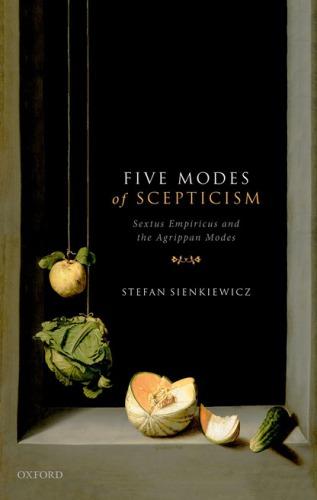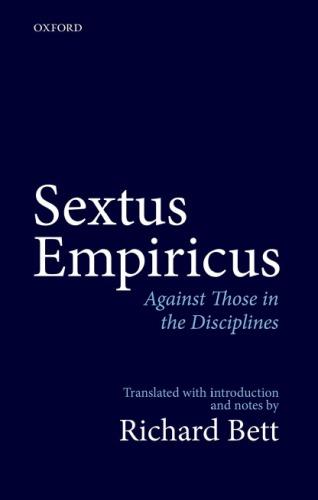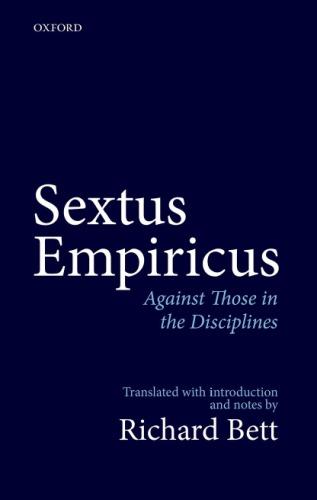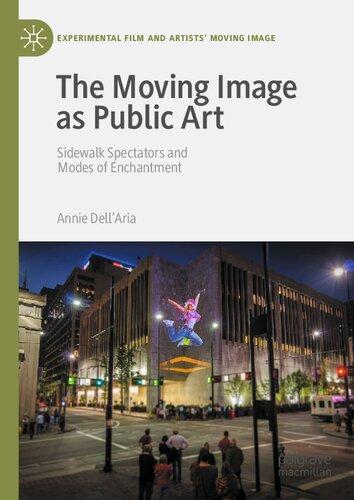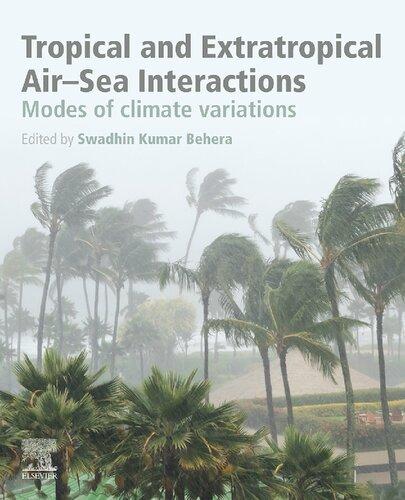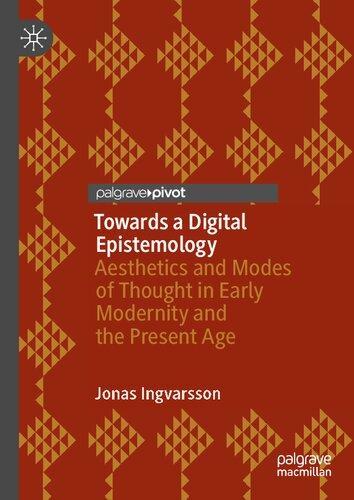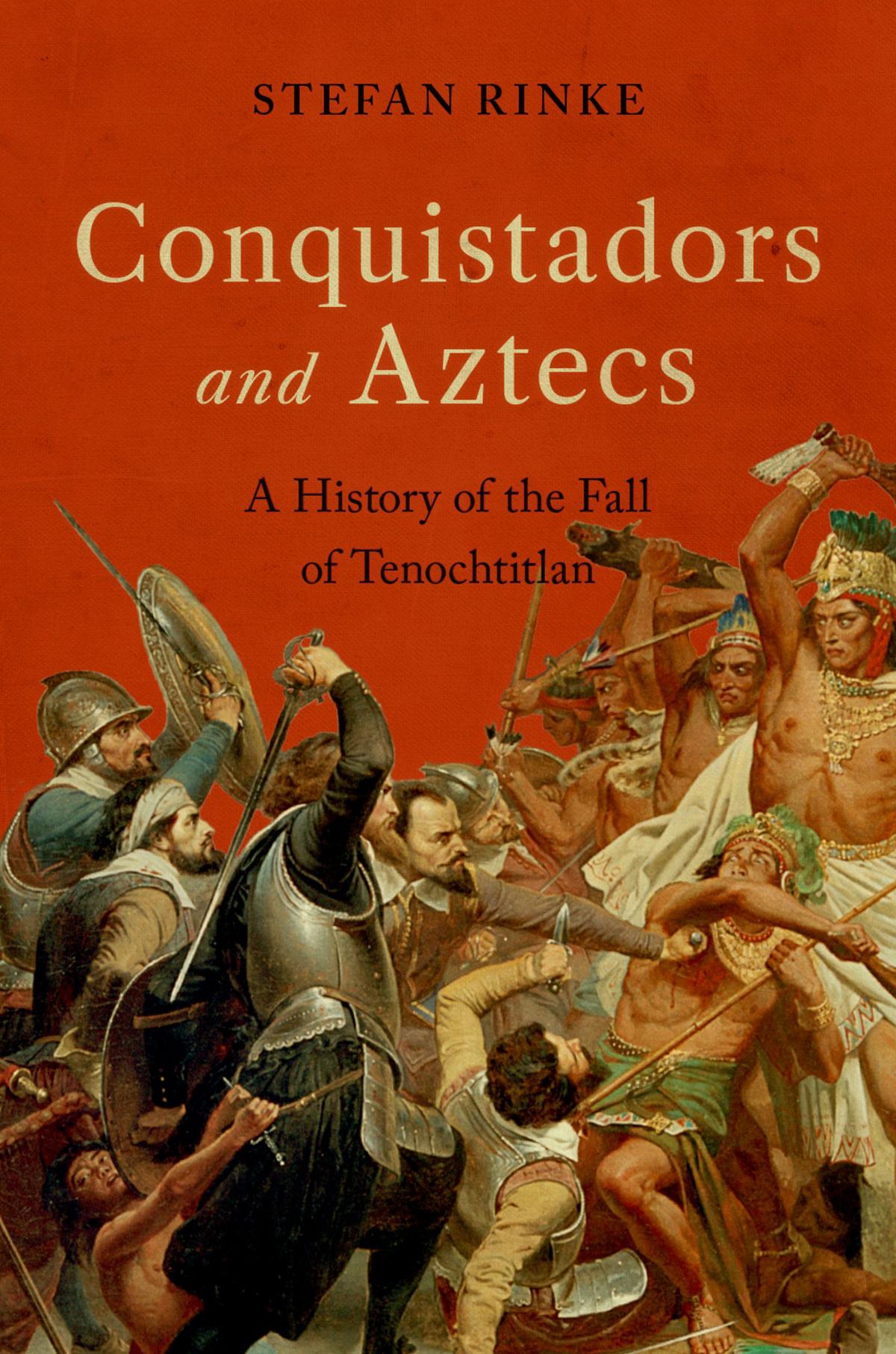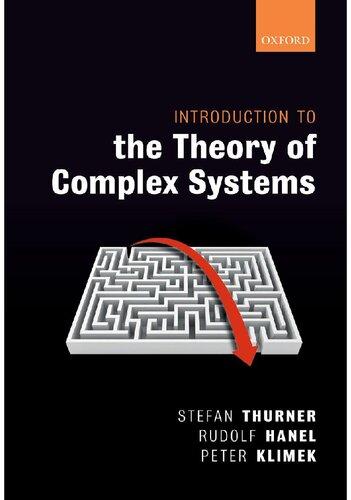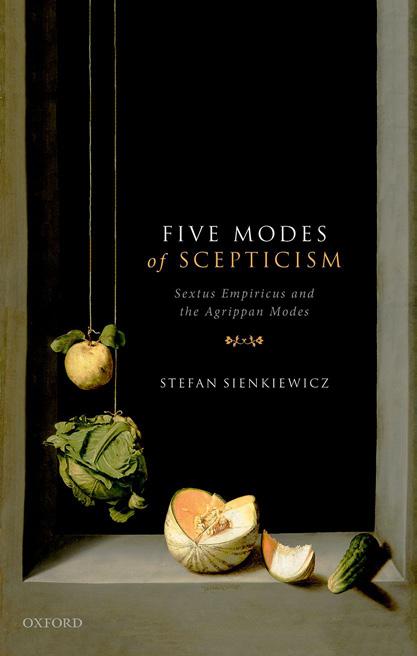FiveModes ofScepticism
SextusEmpiricus andtheAgrippanModes
StefanSienkiewicz
GreatClarendonStreet,Oxford,OX26DP, UnitedKingdom
OxfordUniversityPressisadepartmentoftheUniversityofOxford. ItfurtherstheUniversity’sobjectiveofexcellenceinresearch,scholarship, andeducationbypublishingworldwide.Oxfordisaregisteredtrademarkof OxfordUniversityPressintheUKandincertainothercountries
©StefanSienkiewicz2019
Themoralrightsoftheauthorhavebeenasserted
FirstEditionpublishedin2019
Impression:1
Allrightsreserved.Nopartofthispublicationmaybereproduced,storedin aretrievalsystem,ortransmitted,inanyformorbyanymeans,withoutthe priorpermissioninwritingofOxfordUniversityPress,orasexpresslypermitted bylaw,bylicenceorundertermsagreedwiththeappropriatereprographics rightsorganization.Enquiriesconcerningreproductionoutsidethescopeofthe aboveshouldbesenttotheRightsDepartment,OxfordUniversityPress,atthe addressabove
Youmustnotcirculatethisworkinanyotherform andyoumustimposethissameconditiononanyacquirer
PublishedintheUnitedStatesofAmericabyOxfordUniversityPress 198MadisonAvenue,NewYork,NY10016,UnitedStatesofAmerica
BritishLibraryCataloguinginPublicationData
Dataavailable
LibraryofCongressControlNumber:2018965178
ISBN978–0–19–879836–1
PrintedandboundinGreatBritainby ClaysLtd,ElcografS.p.A.
LinkstothirdpartywebsitesareprovidedbyOxfordingoodfaithand forinformationonly.Oxforddisclaimsanyresponsibilityforthematerials containedinanythirdpartywebsitereferencedinthiswork.
Formyparents,RichardandNaz foreverything.
5.TheModeofRelativity125
6.TheModesCombined154
Acknowledgements
Thisbookowesmuchtomany.MyinterestinSextusEmpiricuswas sparkedbackwhenIwasanundergraduatewhenIstumbledacross JonathanBarnes’ s TheToilsofScepticism,withoutwhich simply put thisbookwouldnotexist.Thatsparkwasfannedbyattendinga splendidseriesoflecturesonSextusbyBenjaminMorison,who first promptedmetothinkmoreaboutthetheoreticalunderpinningsofthe AgrippanmodesandunderwhoseexpertguidanceIbegantoarticulate, inanMStthesis,someoftheideasthatstill findexpressioninthe followingpages.Somanyoftheinsightsofthisbook ifinsightsthey be Iowetomyconversationswithhim.TomyDPhilsupervisor,David Charles,whoseacuity,diligence,kindness,andgenerosity bothphilosophicalandotherwise remainformeexemplary,Ioweadebtthat cannotberepaid.Tomytwodoctoralexaminers JonathanBarnesand ThomasJohansen withoutwhoseencouragementandadvicethisbook wouldnothaveseenthelightofday,Ioffermyheartfeltthanks.Finally, toPeterMomtchiloffforhispatienceandgoodhumourandtothe anonymousreadersforOxfordUniversityPress,whoseextensiveand thoughtfulcommentshaveimprovedthecontentsofthisbooknoend, Iamdeeplygrateful.
Intermsofscholarship,thewritingsoftwoindividuals,inparticular, demandsinglingout: first,BenjaminMorison,whoseworkonthe AenesidemanmodeshasmuchinfluencedmythinkingabouttheAgrippanmodes,and,second,JonathanBarnes,whosepioneeringSextan studieshaveprovidedthefoilformuchofthecontentsofthisbook. AhastyreadermightbeforgivenforinferringthatIonlycitetheworkof BarneswhenIwishtodisagreewithitorwhenIwishtocontrastapath takenbyBarneswithanalternativepathdownwhichIsubsequently tread.Nothingcouldbefurtherfromthetruth.Thoughitwillbeplain fromthefollowingpagesjusthowmuchIowetothewritingsofJulia Annas,RichardBett,MylesBurnyeat,MichaelFrede,R.J.Hankinson, BenjaminMorison,CaseyPerin,andGiselaStriker,JonathanBarnes’ s influencewillbeapparentonvirtuallyeverypage.
Movingfromindividualstocollectives,Iwouldliketoexpressmy gratitudetotheancientphilosophycommunityinOxfordofwhich in onewayoranother Ihavebeenamemberforthepastfourteenyears.It hasbeenatthecentreofmyintellectuallifeandhasgivenmesomuch. Longmayit flourish.Itisimpossibletorecordherethenamesofallof thephilosopherswhohavehelpedmeinthewritingofthisbook let aloneallofthosephilosophersfromwhomIhavelearned butfortheir conversation,correspondence,advice,andencouragementalongtheway Iwouldliketothank:TomAinsworth,JasonCarter,UrsulaCoope, MatthewDuncombe,GailFine,MarkGatten,EdwardHussey,Terry Irwin,DhananjayJagannathan,LindsayJudson,NakulKrishna,Harvey Lederman,TamerNawar,MichaelPeramatzis,MartinPickup,Gonzalo Rodriguez-Pereyra,ChristopherShields,GiselaStriker,JamesStuddand RobWatt.
Iwouldalsoliketogiveheartythankstothefollowinginstitutions:to theOxfordcollegesofChristChurchandOrielforsupportingmesowell asastudentandtoBalliolforsupportingmesowellasafellow;tothe AHRCforawardingmethefundingrequiredtocompletemypostgraduatestudies;totheBodleianLibrarywherevirtuallyeverywordofthis bookwaswrittenandtotheLondonLibraryandtheInstituteofClassical StudiesLibrarywhereagooddealofthemwererewritten.Inparticular, IwouldliketothankmywonderfulBalliolcolleaguesbothinphilosophy andinclassicsformakingthelast fiveyearssuchapleasure.Iraiseaglass toAdamCaulton,AlexKaiserman,AdrianKelly,OfraMagidor,Jonny McIntosh,MatthewRobinson,RowlandStout,RosalindThomasand DavidWallace.
Last butbynomeansleast Iwanttorecordadebtthatcannotatall easilybeputintowords.Tomyfamily(inparticularmyparents,Richard andNaz,towhomIdedicatethisbook),toEmma,andtoeveryoneof myfriends forallthosenameless,unremembered(andremembered) actsofkindnessandoflove,thankyou.Thisbookwouldnothavebeen writtenwithoutyou.OfthatIamnotintheleastbitsceptical.
STEFANSIENKIEWICZ
BalliolCollege,Oxford April2018
Introduction
Thisbookhasasitsfocusaparticulartypeofphilosophicalscepticism andaparticularaspectofthatparticulartypeofscepticism.Thetypeof scepticisminquestionisPyrrhonianscepticismandtheparticularaspect ofthattypeofscepticismisitsAgrippanaspect.¹PyrrhoandAgrippaare shadowycharacters Agrippatheshadowier andinthefollowing pagesnotonecitationofeitherPyrrhoorAgrippaistobefound.This isforthesimplereasonthatnoneoftheirwritings(if,indeed,Pyrrho wroteanythingatall²)survive.³Instead,themaintextualsourceforthis study,whichisalsoourmaintextualsourceforancientPyrrhonismin general,is TheOutlinesofPyrrhonism bythethird-century AD doctorand philosopherSextusEmpiricus.⁴ ItistheversionofPyrrhonianscepticism presentedtousinthepagesofSextus’ Outlines withwhichIshallbe concerned.⁵
¹Othervarietiesofscepticism forexampletheAcademicandtheCartesian donot feature.
²AccordingtoSextus,PyrrhowroteapoemforAlexandertheGreat(M 1.282). DiogenesLaertiusinhis LivesofthePhilosophers claims,atonepoint,thatPyrrhowrote nothingatall(I16)and,atanother,thatheleftnothinginwriting(IX102).Whateverthe truthofthematter,itisreasonabletoinferthatnoneofPyrrho’swritingswasphilosophical.
³AgrippaismentionedonceinDiogenesLaertiusIX88.Therearenoothermentionsof himintheancienttextsandnoneofhisworkssurvive.ThesituationregardingPyrrhois marginallybetter.HisnamecropsupinDiogenesLaertius,Sextus,andPlutarch;andin Eusebius’ PreparationfortheGospel (Praep.evang. XIVxviii1–4)asummaryisofferedof someaspectsofhisthoughtbyhisstudentTimon.Idiscussthispassageingreaterdetailin Chapter1n.17.ForfurtherinformationonPyrrhoseeSedley(1983),pp.14–16andBett (2000).
⁴‘PH’ isthestandardabbreviation.
⁵ Ishallalso,occasionally,makereferencetoSextus’ otherworks,namely Againstthe Mathematicians 1–6and AgainsttheMathematicians 7–11(thestandardabbreviationis M). However,mymainfocuswillbeonthe Outlines.FortheGreektextsIhaveusedthe standardTeubnereditions: PH (ed.)MutschmannandMau(1958); M 7–11(ed.)
UnlessIsayotherwise,by ‘sceptic’ IshouldbetakentomeanPyrrhonian sceptic,by ‘Pyrrhoniansceptic’ IshouldbetakentomeanPyrrhonian scepticaspresentedbySextusinthe Outlines andby ‘Agrippanaspectof Pyrrhonianscepticism’ Ishouldbetakentomeanthose fiveargument forms(or ‘modes’)whichSextusoutlinesforusat PH 1.164–79andwhich DiogenesLaertius(IX88)attributestoAgrippa.⁶ Theyarethemodesof disagreement,hypothesis,infiniteregression,reciprocity,andrelativity. ThesearebynomeanstheonlyargumentformsSextusdiscussesinthe Outlines PH 1.35–63,forinstance,istakenupwithanexpositionoften Aenesidemanmodesand PH 1.180–6advertstoeightmodeswhichtarget causalexplanations.However,Ishallnotcommentuponeitherofthese othersetsofmodes,unless,insodoing,lightisshedononeormoreofthe Agrippanmodes.⁷
WhythisAgrippanfocus?Thereareatleastthreereasons.First,these modeslieattheheartofthesceptic’sargumentativepractice.Sextus adducesthemtimeandagaininthe Outlines indeedtheycanbeseento underpinboththetenAenesidemanmodesandtheeightmodesagainst casualexplanation,thoughtofullyelaborateonthisclaimwouldrequire writingadifferentbookfromtheoneIhavewritten.
Secondly,theseargumentformshaveintrinsicandabidingphilosophicalinterest.Ihopeasenseoftheirintrinsicphilosophicalinterest emergesfromthesubsequentpages.Asforevidenceoftheirabiding interest,onemightpointtothefactthattherehas,inrecentyears,beena surgeofinterestintheepistemologyofdisagreement.⁸ Indeed,takingthe longerview,onecanpointtothefactthatthescepticalproblemposedby thecombinedmodesofinfiniteregression,reciprocity,andhypothesis
Mutschmann(1914); M 1–6(ed.)Mau(1961).Translationsof PH arebasedonAnnasand Barnes(2000).Translationsofotherancienttextsaremyown.
⁶ Sextusattributesthemodesto ‘themorerecentsceptics’ (οἱ νεώτεροι)at PH 1.164. Thesescepticsarepresumablymorerecentthanthe ‘oldersceptics’ (οἱἀρχαιότεροι)of whomSextusspeaksat PH 1.36andtowhomheascribesthetenmodes.Elsewhere,at M 7.345,SextusattributesthetenmodestoAenesidemus,sowemightdatethemorerecent scepticsof PH 1.165tosomewherebetweenAenesidemusandSextus,thatisbetween100 BC and AD 200.ForfurtherdetailonAenesidemus’ datesseeGlucker(1978),pp.116–18andon Sextus’ seeHouse(1980).
⁷ ForreflectionsontheAenesidemanmodesseeAnnasandBarnes(1985),Striker (1996a),andMorison(2011)andontheeightmodesagainstcausalexplanationseeBarnes (1983).
⁸ See,bywayofexample,theanthologiesbyFeldmanandWarfield(2010)andChristensenandLackey(2013).
hasbeenaperennialsourceofreflectionforepistemologists.Inthewords ofLaurenceBonjouritis ‘perhapsthemostcrucialintheentiretheoryof knowledge’ ⁹
Thirdly,andformypurposesmostsignificantly,thosecommentators who have discussedtheAgrippanmodes,have forthemostpart failedtodistinguish,ortodistinguishsufficientlycarefully,between twoimportantlydifferentperspectivesonthesemodes.Itisthearticulationofthesetwodifferentperspectiveswhichisthecentralthemeof thisbook.
TheAgrippanmodesareintroducedtousbySextusat PH 1.164as modesof epochē ascepticaltermofartwhichSextusglossesforusat PH 1.10asastandstilloftheintellect(
),owingtowhich weneitherrejectnorpositanything(
Thetermisoftentranslatedbythephrase ‘suspensionofjudgement’ and thisisthetranslationadoptedinthesepages.Insubsequentchapters Iadoptthefollowingcharacterizationofthephenomenon:someepistemicsubject,S,suspendsjudgementwithregardtosomeproposition, P,justincase,havingconsideredthematter,SneitherbelievesPnor believesnot-P.¹⁰ Thisbook,then,asksofthe fiveAgrippanmodes,both individuallyandcollectively,howtheybringaboutsuspensionofjudgement,sounderstood.Inparticular,toreiterateitscentraltheme,it identifiestwodifferentperspectivesonthisquestion:onemightask howsomedogmaticphilosophercomestosuspendjudgementonthe basisofoneormoreofthesemodes,oronemightaskhowasceptic comestosuspendjudgementonthebasisofoneormoreofthesemodes.
⁹ Bonjour(1985),p.18.
¹⁰ The ‘havingconsideredthematter’ clauseisimportantbecauseitpreventssuspension ofjudgementarisingtooeasily.Withoutit,Iwouldstandinarelationofsuspended judgementtoawholerangeofpropositionsjustbyvirtueofneverhavingentertained anyofthepropositionsinquestion.Forexample,untilwritingthissentence,Ihavenever givenamoment’sthoughtastowhetherornotParmenideswasleft-handed.Itherefore neitherbelievednordisbelievedtheclaim,butthatisnottosaythatIsuspendedjudgement onthematter.Sextushimselfemphasizesthatsuspensionofjudgementoversomequestion onlyarisesoncetheargumentsonbothsidesofthequestionhavebeenconsidered(PH 1.8). Forarecentanalysisoftheconceptofsuspendedjudgement,whichdepartsfromthis SextanwayofconstruingsuspensionofjudgementandinsteadarguesthathavingconsideredwhetherPisneithernecessarynorsufficientforsuspendingjudgementoverPsee Friedman(2013),pp.165–81.OnFriedman’sview ‘onesuspendsjudgmentaboutponlyif onehasanattitudethatexpressesorrepresentsorjustisone’sneutralityorindecisionabout whichofp,¬pistrue’ (Friedman(2013),p.179).
Thesearedifferentquestionsbecausethescepticandthedogmatistare verydifferentsortsofepistemicagent.Onebasicdifferenceisthatthe sceptic,unlikethedogmatist,isrestrictedwithregardtothesortsof beliefhecanhold.AsSextusinformsusinacelebratedpassageofthe Outlines PH 1.13 thescepticdoesnotholdanybeliefs,theholdingof whichinvolvesassentingtosomeunclearobjectofinvestigationofthe sciences(
).Twomaininterpretativetraditionsdetailingthesortsof beliefsascepticisprohibitedfromholdinghavesprungupfromthewelltilledsoilofthe PH 1.13passage,thedetailsofwhichdonotneedto concernushereinthisIntroduction theywillconcernuslater.Itwill suf ficetosaythat,accordingtooneofthesetraditions,thescepticis prohibitedfromholdingbeliefswhichhavetheoreticalcontent(which ItermtheContentInterpretation)and,accordingtotheother,the scepticisprohibitedfromholdingbeliefswhicharearrivedatbya processofreasoning(whichItermtheGroundsInterpretation).¹¹For themoment,letusrefertotheseprohibitedbeliefsas ‘theoreticalbeliefs’ . The PH 1.13passage,therefore,tellsusatleastonethingaboutthe respectivewaysinwhichascepticandadogmatistcometosuspend judgementonthebasisoftheAgrippanmodes:thedogmatist can reach suspendedjudgementbyrelyingonvarioustheoreticalbeliefs,buta sceptic cannot.
OfthosecommentatorswhohaveprobedtheworkingoftheAgrippan modes,themostsignificanttreatmenttodateisthatofJonathan Barnes.¹²Thoughtherehavebeen(albeitbriefer)treatmentsofthe modesbyR.J.Hankinson,HaraldThorsrud,andPaulWoodruff,itis Barnes’sworkwhichwillprovidethemainfocusforthisstudy.¹³Ithas twomainaims.The firstistoshowthatthereconstructionofferedby commentators,likeBarnes,ofsomeofthemodes inparticularthe modesofinfiniteregressionandreciprocity isadogmaticone.By thisImeanthatitisareconstructionwhichcapturesperfectlywell howadogmaticphilosophermightcometosuspendjudgementonthe
¹¹Barnes(1982)andBurnyeat(1984)canbeseenasrepresentativeoftheContent Interpretation,Frede(1987)andMorison(2011)oftheGroundsInterpretation.Ielaborate onthesetwotraditionsofinterpretationingreaterdetailinChapter1.
¹²SeeBarnes(1990a)andBarnes(1990b).
¹³SeeHankinson(1995),Thorsrud(2009),andWoodruff(2010).
basisofthesemodes,butwhichcannotcapturehowascepticmight cometodoso.¹⁴ Thereasonforthisisthatontheproposedreconstruction,thescepticwouldhavetoholdavarietyoftheoreticalbeliefsto whichheisnotentitled.
Thesecondaimistoeffectachangeofperspectivebyapproachingthe questionofhowthemodesingeneralaremeanttobringaboutsuspensionofjudgement not fromthepointofviewofthedogmatist,butfrom thepointofviewofthesceptic.Inthisrespect,thebookcanbeseenas openingupanalternativetoalineofthinkingadvancedbyMichael Frede.OnFrede’sview,thevarious first-personlocutionsthatpepperthe Outlines locutionssuchas ‘wecometosuspendjudgement’—aretobe understoodasclaimsmadebyascepticwhoadopts,temporarilyand purelyfordialecticalpurposes,asetofdogmaticassumptionsand patternsofreasoning.¹⁵ Thepresentworkcanbeseenasanattemptat seeinghowfaronecantaketheselocutionsatfacevalue thatis,taking themasclaimswhichascepticmakesonhisownbehalfandnotfor purelydialecticalreasons.
Lestthispointbemisunderstood,letmestressthat,inwhatfollows, ItakenoviewastowhetherSextus himself wasascepticwholackedall theoreticalbeliefs.¹⁶ InthefollowingpagesIoftenspeakofSextus ‘formulatinganargument’ or ‘drawingaconclusion’ or ‘objectingtoa lineofreasoning’,activitieswhich,onemightreasonablythink,would requiretheholdingofatleastsomeminimallytheoreticalbeliefs.The pointissimplytoseehowonemightcharacterizethesceptic’sbehaviour if, pace Frede,oneinterpretsthose first-personutterancesinthecontext oftheAgrippanmodesasutterancesmadebyascepticwhomakesthem sincerelyandnotforpurelydialecticalreasons.
InreconstructingtheAgrippanmodesfromascepticalandnota dogmaticperspectivetwoquestionsinparticularwillbedistinguished fromoneanotherandaddressed:thequestionastohowthescepticputs themodestouseinhistussleswithhisdogmaticopponents,andthe questionastohowascepticmightcometosuspendjudgementonthe
¹⁴ Notethatthedogmatistcouldeitherbethehistorical figurewithwhomthesceptic tussledorthecontemporaryhistorianofphilosophywhoanatomizes,analyses,reconstructs,andpassesjudgementontheeffectivenessofthesceptic’sarguments.
¹⁵ SeeFrede(1987c),pp.204–5.
¹⁶ LorenzoCortihasemphasizedtomeinconversationtheimportanceofdistinguishing Sextusfromthescepticreferredtoinhispages.
basisofthosemodes.Thestartingpointformyresponsetothese questionsisgroundedinaninsightIsharewithBenjaminMorison, whohasrecentlyraisedthepossibilityofinterpretingtheAgrippan modesinlightofthesceptic’smethodofequipollence.¹⁷ Thisisamethod thatinvolvesopposingtoeveryargumentoneencounters,anargument ofequalforcebutwithaconclusionincompatiblewiththeconclusionof theoriginalargument.
ItwillemergethattheAgrippanmodesenduphavingverydifferent argumentativestructuresdependingonwhetherwethinkofthemfrom theperspectiveofthescepticorfromthatofthedogmatist.What inferencescanbedrawnregardingSextus’ literaryintentionsfromthis factisnotaquestionIpursue.Itmaybethecasethatintextswherehe discussestheAgrippanmodes,Sextusisself-consciouslysimultaneously addressingbothascepticalandadogmaticreader,awarethatthe Agrippanmodescouldequallybringascepticandadogmatisttosuspendjudgement.ButmyconcerninthisbookisnottodivineSextus’ literaryintentions.Itissimplytostressthatthemodeswillhaveto displaythesedifferentargumentativestructures dependingonwhether wethinkofthemasworkingonascepticoronadogmatist irrespective ofwhetherSextushimselfrecognizedthatfact.¹⁸
Thedetailsofmyattempttogiveanaccountofthesceptic’sdeploymentoftheAgrippanmodes bothagainsthisdogmaticopponentand againsthimself intermsofhisequipollentabilitywillemergeinthe followingpagesandchapters.FortheremainderofthisIntroduction Ishalloutlinetheoverallstructureofthisbookandthemainconclusions thataredrawnineachofitschapters.
UnlikeGaul,itisdividedintosixparts.The first fivedealwiththe modesindividually.The finalsixthconsidersthemincombinationwith oneanother.TheorderinwhichItreatthemodesdoesnotreflectSextus’ ordering.Thoughwebothbeginwithdisagreement,wethendiverge.¹⁹ MyreasonforalteringtheorderinwhichSextuspresentsthemispurely foreaseofexposition,asthefollowingsketchofeachchaptershould makeclear.
¹⁷ Morison(2014),§3.5.2.
¹⁸ Mythankstotheanonymousreaderfordrawingmyattentiontothispoint.
¹⁹ Myrunningorder:disagreement,hypothesis,infiniteregression,reciprocity,and relativity.Sextus’:disagreement,infiniteregression,relativity,hypothesis,andreciprocity.
Ibegin,inChapter1,withthemodeofdisagreement.Aftersome preliminaryremarksabouthowthephenomenonofdisagreement shouldbeunderstood,Idistinguishtwodifferentprinciples(consistent withSextus’ remarksinthe Outlines)whichconnectthephenomenonof disagreementwithsuspensionofjudgementandtwocorresponding versionsofthemodeofdisagreement.Oneversion,whichturnsonthe phenomenonofdisagreementbetweenepistemicpeers,is,Iargue,a dogmaticversionofthemode dogmaticinthesensethatthesceptic cannotcometosuspendjudgementonthebasisofit.Thisisbecausethe dogmaticversionofthemodeturnsonanumberoftheoreticalclaims whichascepticisnotinapositiontobelieve.Asecondversion,which turnsonthenotionofundecideddisagreementformsthebasisofa scepticalversionofthemode thatis,amodeonthebasisofwhich ascepticmightcometosuspendjudgement.Thisisbecause,itisargued, itisoneandthesamethingtosuspendjudgementonthebasisof undecideddisagreementandtosuspendjudgementonthebasisofa pairofequipollentarguments.
Tomakesenseofhowthescepticcomestosuspendjudgementonthe basisofthemodeofdisagreementis,therefore,oneandthesameprojectas makingsenseofhowthescepticcomestosuspendjudgementonthebasis ofhisownequipollentability.InthelatterpartofthechapterIarguethat, whetheroneadoptstheContentInterpretationortheGroundsInterpretation,itispossibletomakesenseofhowthescepticcomestosuspend judgementonthebasisofhisequipollentability andthereforeonthe basisofthemodeofdisagreement.However,Ialsopointoutthatthe explanationofthesceptic’scomingtosuspendjudgementismore involvedifoneadoptstheGroundsInterpretation.Thisisbecause,on theGroundsInterpretation,thescepticcannotbelievethatheisrationally requiredtosuspendjudgement.FollowingadistinctiondrawnbyCasey Perin,IsuggesthowsomeonewhoadoptstheGroundsInterpretation mightmakesenseofhowthescepticcomestosuspendjudgementby distinguishingtwophasesinthesceptic’scareer:aproto-scepticalphase duringwhichthescepticsuspendsjudgementbecausehebelievesitisthe rationalthingtodoandamaturescepticalphaseduringwhichthesceptic suspendsjudgementnotbecausehebelievesitistherationalthingtodo, butbecausehehasdevelopedapsychologicaldispositiontodoso.
Thechapterclosesbymovingawayfromthequestionastohowthe scepticcomestosuspendjudgementonthebasisofthemodeof
disagreementandreflectsonthefactthatundecideddisagreementis utilizedbythescepticintwoways:thescepticisbothachroniclerof undecideddisagreementsthatragebetweenvariousdogmatistsand himselfacreatorofundecideddisagreementbyvirtueofexercisinghis equipollentability.Anappreciationofthesetwowaysinwhichthemode mightbedeployedisshowntoofferthebeginningsofaresponsetoan objectionthathassometimesbeenmaderegardingthepowerofthe modeofdisagreement namelythatinstanceswherethemodewillbe effectivearefewandfarbetween.
Chapter2centresonthemodeofhypothesis.Theopeningsections clarifywhatisinvolvedintheactofhypothesizing,andadistinctionis drawnbetweendogmaticandscepticalhypotheses wheretheformer arethosehypotheseswhichthesceptic’sdogmaticopponentputsforwardtoavoidfallingvictimtoeitherthemodeofinfiniteregressionor themodeofreciprocity,andthelatterarethosehypotheseswhichthe scepticputsforwardandwhichhecastsinoppositiontothedogmatist’ s. Threedifferentversionsofthemodearethenextractedfromthe Outlines anditisarguedthatthethirdoftheseisthemostsignificant(andindeed underpinstheotherversions).Itisnotedthatthemodeofhypothesis, whenutilizedbyasceptic,isalimitingcaseofthesceptic’smethodof equipollence:tothedogmatist’shypothesisthescepticopposeshisown incompatiblehypothesisandthesehypothesesareequipollentbecause theyaresupportedbypreciselythesamekindofargument,namelyno argumentatall.
Beingalimitingcaseofthemethodofequipollence,themodeof hypothesisthereforeemergesasauniqueAgrippanmode.Unlikethe modeofdisagreement(whichChapter1showedcouldhavebotha scepticalandadogmaticface)andunlikethemodesofinfiniteregression andreciprocity(whichChapters3and4goontoshowalsohave scepticalanddogmaticincarnations),themodeofhypothesisisjustan instanceofthesceptic’smethodofequipollence.Chapter2concludesby givinganaccount paralleltothatgivenregardingthescepticalversion ofthemodeofdisagreementinChapter1 ofhow,onboththeContent InterpretationandtheGroundsInterpretation,thescepticcancometo suspendjudgementonthebasisofthemodeofhypothesis.
Chapter3isconcernedwiththemodeofinfiniteregression.Barnes’ s reconstructionofthemodeisanalysedandamodi fiedversionofitis offeredsothatityieldsasuspensiveconclusion.Itisthenarguedthatthis
modifiedversionisadogmaticversionofthemode,for,onBarnes’ s view,someepistemicsubjectsuspendsjudgementonthebasisofthe modeofinfiniteregressionbyframingtohimselfanargumentwitha numberoftheoreticalpremises,forexamplethepremisethatinfinitely regressiveargumentsarebadkindsofargument.Itisnotedthatwhen thescepticexercisesthemodeofinfiniteregressionthatismerelya particularinstanceofhismethodofequipollence:opposingtoone infinitelyregressiveargumentanotherinfinitelyregressiveargument withaconclusionincompatiblewiththeconclusionoftheoriginal argument.Ascepticalversionofthemodeisthenconstructed,andan accountgivenofhow,onboththeContentandtheGroundsInterpretation,thescepticisabletocometosuspendjudgementonthebasisof themode.
Chapter4hasasimilarstructuretoChapter3,thoughherethemode underscrutinyisthemodeofreciprocity.FollowingBarnes,threedifferentkindsofreciprocityareidentifiedinthe Outlines,anditisargued thatonlyoneofthesekindsofreciprocity formalreciprocity isrelevanttoanunderstandingofthemode.Barnes’sreconstructionofthe modeisthenanalysedandforanalogousreasonstothosementionedin Chapter3,itisarguedthattheversionofthemodeofferedbyBarnesisa versionbywhichadogmatistmightcometosuspendjudgement,butnot asceptic.Chapter4closesasChapter3closed.Itisnotedthatthe sceptic’suseofthemodeofreciprocityisaparticularinstanceofhis equipollentability,andascepticalversionofthemodeispresented. Accordingtothisversionofthemode,thescepticsuspendsjudgement whenconfrontedbyapairofequipollentreciprocalargumentsjustashe didwhenconfrontedbyapairofequipollenthypothesesinChapter2 andbyapairofequipollentinfinitelyregressiveargumentsinChapter3.
Chapters1–4,then,form orshouldform acoherentwhole.In Chapter1,thescepticalversionofthemodeofdisagreementwas showntobeequivalenttothephenomenonofequipollentargumentationbutwherethetypeofequipollentargumentationinquestionisleft unspecified.Chapters2,3,and4canbethoughtofasprovidingexamples ofparticularkindsofequipollentargumentation hypotheticalargumentationinthecaseofChapter2,infinitelyregressiveargumentation inChapter3,andreciprocalargumentationinChapter4.
Chapter5,bycontrast,isananomalouschapter,partlybecausethe modewithwhichitisconcerned relativity isananomalousmode.
Onerespectinwhichitisanomalousisthefactthatitoccurstwiceinthe Outlines,onceasanAenesidemanmode,andonceasanAgrippanone. Chapter5opensbyremarkingonthisfact,andarguesthattheAgrippan modeofrelativitymustbeunderstoodintermsoftheAenesideman mode.TherestofthechaptercanbeviewedaspresentinganySextan interpreterwithtwodilemmas.The firstdilemmaistodecidewithwhich typeofrelativitySextusisconcerned forthreedifferentkindsofrelativityaretobefoundinSextus ’ discussionofthemode.Itisarguedthat onlyoneofthesekindsofrelativityisnon-trivial,butifthisisthekindof relativityoneoptsfor,thenonefacesasecondinterpretativedilemma whenitcomestointegratingthenon-trivialversionofthemodeof relativityintoasystemwhichincludestheotherfourAgrippanmodes. Foritisarguedthatthenon-trivialmodeofrelativityisincompatible withthemodeofdisagreement.Giventheimportanceofthephenomenonofdisagreement,andgiventhefactthatarelativisticthesisisvery muchthesortofthesisoverwhichascepticwouldsuspendjudgement, Chapter5closesbysuggestingthat,ifthechoiceaSextaninterpreter facesisachoicebetweenrejectingthemodeofdisagreementorrejecting themodeofrelativity,optingforthelattercourseofactionispreferable.
Thesixthand finalchapteranalyseshowtheAgrippanmodes(excludingrelativityforthereasonsgiveninChapter5)aremeanttoworkin combinationwithoneanother.Inthe Outlines Sextuspresentsuswith twosuchcombinations,which,followingBarnes’sterminology,Ireferto as ‘nets’.The firsthalfofChapter6offersreconstructionsofeachofthese netsinturn.Inparticular,IpresentanewversionofSextus’ firstnet whichinterpretsitintermsofthreepossibledialecticscenariosthat obtainbetweenascepticandthreekindsofdogmaticopponent,and suggest, pace Barnes,that,thoughcomplex,itdoesnotlackphilosophical cohesion.Regardingthesecondnet,whichisoftenseenassuperiortothe first,itisnotedthatitisnotfreefromfault inparticularregardingits omissionofthemodeofhypothesis.
The finalpartofthechaptercomparesbothnetswithathirdnetnotto befoundinthepagesofSextusbutdevisedbyBarnes.Itisobservedthat Barnes’snetiseasiertocomprehendandfreefrommanyofthedefects whichafflictbothSextus’ firstandsecondnets.However,afternoting thatBarnes’snetomitsthemodeofdisagreement,afourth,modi fied versionofBarnes’snetwithdisagreementincorporated,ispresented. Thechapterclosesbyreflectingonthefactthatallthevariousnetsthus
farconsideredrelyonanumberoftheoreticalassumptionswhicha sceptichimselfcannotmake.
Thechapter(andthebook)thereforeendsonanironicalnote:though thescepticisperfectlyabletodeployanyofthemodesindividually (indeed,oneofthemoralsofChapters1–4wasthatindeployingthe modesthescepticismerelyexercisinghisequipollentability),whenit comestoorganizingthemintoascepticalsystem,thisisataskwhich,as itturnsout,onlyadogmatistcanperform.
1
TheModeofDisagreement
Howdoesthemodeofdisagreementgiverisetothesuspensionof judgement?Thatisthequestionwithwhichthisopeningchapteris concerned.The firsthalfofthechapterisdevotedtounpackingwhatis meantby ‘disagreement ’ and,inparticular,whatismeantby ‘undecided disagreement’.Thesecondhalfisconcernedwitharticulatingtheconnectionbetweenundecideddisagreementandthesuspensionofjudgement.Asoutlinedintheintroduction,twoversionsofthemodewillbe presented:oneversionwhichcaptureshowadogmatistmightcometo suspendjudgementonthebasisofthemodeandanotherversionby meansofwhichascepticmightcometodoso.
SomeFeaturesofDisagreement
TheGreekfor ‘disagreement’ is diaphōnia.Barnes,withahelpinghand fromJanacek,hascountedabout120instancesofthewordandits cognatesinSextus ’ works.¹Andwhentermswhichoverlapinmeaning with diaphōnia aretakenintoaccount like stasis, diastasis, amphisbētēsis, anōmalia, machē,and polemos aswellastermswhichpointtothe absenceof diaphōnia like sumphōnia, homophōnia,and homologia thenumberofreferences,bothdirectandindirect,todisagreementinthe Sextancorpusswellstoover200.
AnotionthenthatSextusthoughtimportant.Buthowbesttocharacterizeit?Twofeaturesinparticularrequireelucidation.First,what kindsofitemarethe relata thatareyokedtogetherbytherelationof diaphōnia?Andsecond,whatdoestherelationof diaphōnia itselfconsist in?Barnesprovideshelpfulanswerstobothofthesequestions.²
¹Cf.Barnes(1990a),p.8n.8;Janacek(1962),pp.70–1. ²Barnes(1990a),pp.11–13.
Regardingthe firstquestionheclaimsthat diaphōnia isarelationwhich holdsbetweenopinionsratherthanbetweenpropositions.Regardingthe secondhesuggeststhatwhentwo(ormore)opinionsstandinarelation of diaphōnia tooneanother,thisamountstotherebeingacertainkindof conflictbetweenthoseopinions.Bothoftheseclaimsrequirefurther unpackingandItaketheminturn forwhilethesecondistrue(subject tofurtherqualification)the firstisfalse.
This firstremarkshouldnotbemisunderstood.Ofcourse,tosaythat IhavetheopinionthatPisjusttosaythatthereissomeproposition, P,whichIopine.ItakeBarnes’spointtobenotthattheopiningrelation holdsbetweenanepistemicsubjectandsomethingotherthana proposition foritdoesnot.Thepoint,rather,isthat diaphōnia isa relationthatholdsbetween opined propositionsratherthanbetween propositions simpliciter.So,onBarnes’sview,thepropositionthat Vegaisconspicuousoverheadis not inarelationof diaphōnia withthe propositionthatVegaisnotconspicuousoverhead.Rather,my opinion thatVegaisconspicuousoverheadisinarelationof diaphōnia withyour opinion thatVegaisnotconspicuousoverhead.Andmyopinionstands inarelationof diaphōnia withyoursevenifneitherofusisawareofthe other’sastronomicalviews.
Nowitisonething andperfectlytrue tosaythat diaphōnia can holdbetweenopinedpropositions.Itisanother andfalse tosaythat diaphōnia canhold only betweenopinedpropositions.Supposethatyou believethatP,andthatyoubelievethatPonthebasisofsomeargument thatP.FurthersupposethatIopposetoyourclaimthatP,arivaland incompatibleclaim,Q,whichIalsosupportwithsomeargument.From thisdescription,itdoesnotfollowthatIbelievethatQor,indeed,that anyoneelsebelievesthatQ.Imighthavenoopinionwhatsoeveronthe matterandamsimplyarguinginfavourofQbecauseIameristicor becauseIamperverseorbecauseIhavecultivatedacertaindisposition tosoargue.Asweshallsee,thescepticisamemberofthisthirdclassof person:hehascultivatedacertaindispositiontoopposetoanyargument heencountersarivalargumentwithaconclusionincompatiblewiththe conclusionoftheoriginalargument.Igoontodevoteseveralsubsections ofthischaptertospellingoutwhatthisparticulardispositionofthe scepticconsistsin,soIdonothereenterintoanydetailedexpositionof thephenomenon.Whatisimportant,forpresentpurposes,istoemphasizethatthereisnorequirement,givenwhatSextussays,tosupposethat
hewasoperatingwithaconceptionof diaphōnia thatrestrictedthe relata ofthatrelationtobeingopinedpropositions.³
Asforthesecondquestion whattherelationof diaphōnia itself consistsin clearlytwoclaimsmerelybeingdifferentfromoneanother isnotsufficientforthemtostandinarelationof diaphōnia toone another.ImightbelievethatPyrrhowasascepticalphilosopher,while youbelievethatPyrrhotravelledtoIndiawithAlexandertheGreat.Our claimsaboutPyrrhoaredifferent(afteralltheyarenotthesame)but theydonotconflict.Pyrrhocouldbothhavebeenascepticalphilosopher andhavetravelledtoIndiawithAlexandertheGreat. diaphōnia thereforeinvolvesnotmerelyadifferencebetweenclaimsbuta conflict betweenclaims.
Buthowtospelloutwhatitmeansforapairofclaimstoconfl ict? Onenaturalthoughttohaveisthatapairofclaimscon fl ictwhenthey cannotbothbetruetogether.Itdoesnottakemuchre fl ection,however, toseethatthisisinadequate.Notbei ngabletobejointlytrue,evenifit isnecessary,isnotsuf fi cientforapairofclaimstocon fl ict. ⁴ Fromthe factthatPandQcannotbothbetruetogether,itdoesnotfollow thatPcon fl ictswithQ.Theclaimthatmotionexistsandtheclaim thatmotiondoesnotexistcannotbot hbetruetogether.Theclaimthat motionexistsandtheclaimthatHes perusisnon-identicalwithHesperusalsocannotbothbetruetogether.⁵ Butitisnotclearthatthe claimthatmotionexistscon fl ictswiththeclaimthatHesperusisnonidenticalwithHesperusinthesamewayinwhichtheclaimthatmotion existscon fl ictswiththeclaimthatmotiondoesnotexist.Nodoubtthe claimthatmotionexistsandtheclaimthatHesperusisnon-identical withHesperuscannotbothbetrueto getherbutthisissimplyinvirtue ofthefactthatoneoftheseclaims(namelytheclaimthatHesperus isnon-identicalwithHesperus)cannotbetrue.Butthereisnopoint ofcontactbetweenthem,noissueoverwhichtheyaredivided.By contrasttheclaimthatmotionexistsandtheclaimthatmotiondoes notexist are incon fl ictwithoneanother:whatoneclaimassertsthe otherdenies.
³Mythankstotheanonymousreaderforpromptingmetoclarifythispoint.
⁴ SeeBarnes(1990a),p.11n.12whoemphasizesthispoint.
⁵ Equally,theclaimthatmotiondoesnotexistandtheclaimthatHesperusisnonidenticalwithHesperusalsocannotbothbetrue.
Tospelloutingreaterdetailwhatitisfortwoclaimstoconflict overandabovenotbeingabletobejointlytrueisanissueIdonot enterintohere.⁶ Inanycase,ourconceptionof diaphōnia hasbeen somewhatsharpened.Itisrelationthatholdsbetweentwo(ormore) conflictingclaimswhere ‘ conflict’ istobeunderstoodmerelyintermsof notbeingabletobejointlytrue(exceptincaseswhereatleastoneofthe conflictingpropositionsisalogicalcontradictionornecessarilyfalse).
KindsofDisagreement
Withallthatbeingsaid,therearestilldifferentwaysofunderstanding whatitisfortwoclaimstostandinarelationof diaphōnia tooneanother. Supposewehavetwodisputants QuintusandSeptimus.⁷ BarnesdistinguishesbetweenthreewaysinwhichQuintusandSeptimuscould disagreewithoneanother.Toappropriatehisterminology,theymight havea ‘positivedisagreement’ ora ‘disagreementinopinion’ ora ‘disagreementinattitude’ ⁸ AccordingtoBarnes,apositivedisagreement occurswheneverQuintusandSeptimusofferincompatibleanswerstothe samequestion.AdisagreementinopinionoccurseitherwheneverQuintusandSeptimusofferincompatibleanswerstothesamequestion(i.e. positivelydisagree)orwheneverQuintusoffersananswerwhichSeptimusrejects(orSeptimusoffersananswerwhichQuintusrejects).Finally, adisagreementinattitudeoccurswheneverQuintusandSeptimushold conflictingattitudestowardsthesamequestion,whereto ‘takeanattitude’ towardsaquestionis,havingconsideredthematter,eithertoaccept somepropositionastheanswertothequestionortorejectsomepropositionasananswertothequestionortosuspendjudgementoverthe question. ⁹ Furthermore,theseattitudescanconflictinavarietyofways. Acceptingsomeproposition,P₁,conflictswithacceptingsomeother proposition,P₂,whereP₁ andP₂ areincompatiblewithoneanother;
⁶ ForfurtherdiscussionseeStopper(1983),pp.285–6.Therethesuggestionismade(in thecontextofadiscussionoftheStoicnotionofconflict)thattwoclaimsPandQconflictiff neitherPispossiblegivenQandneitherQispossiblegivenP.
⁷ Irestrictmyselftobilateraldisagreementsforthesakeofsimplicity.
⁸ SeeBarnes(1990a),pp.13–15.
⁹ InBarnes’sownwords: ‘Letussaythatsomeone “takesanattitude” toaquestion?Qif, havingconsideredthematter,heeither accepts somepropositionastheanswerto?Qor rejects somepropositionasananswerto?Qor suspendsjudgement over?Q.’ SeeBarnes (1990a),p.15.
acceptingP₁ conflictswithrejectingP₁;andsuspendingjudgementasto whetherP₁ conflictswithacceptingP₁ andwithrejectingP₁.
ForBarnes,theinterrelationsofthesethreekindsofdisagreementare clear.¹⁰ Anythingwhichcountsasapositivedisagreementcountsasa disagreementinopinion,andanythingwhichcountsasadisagreement inopinioncountsasadisagreementinattitude.Buttheconverserelationsdonothold.Anythingwhichcountsasadisagreementinattitude may,butneednot,countasadisagreementinopinionandanything whichcountsasadisagreementinopinionmay,butneednot,countasa positivedisagreement.
NowgivenhowBarneshasdefineddisagreementsinopinion,it follows(trivially)thatanythingwhichcountsasapositivedisagreement countsasadisagreementinopinion.Foradisagreementinopinionhas beendefineddisjunctivelyaseitherapositivedisagreementoradisagreementwhichinvolvesoneofthedisagreeingpartiesofferingananswerto aquestionwhichtheotherpartyrejects(orviceversa).However,itisless clearwhetheritistruethateverydisagreementinopinioncountsasa disagreementinattitude.
SupposeQuintusandSeptimusdisagreeovertheanswertosome question,Q.Fortheretobeadisagreementinopinionbetweenthemis eitherforQuintustoofferP₁ astheanswertoQandforSeptimustooffer P₂ astheanswertoQ,whereP₁ andP₂ areincompatiblewithone another,orforQuintustoofferP₁ astheanswertoQandforSeptimus torejectP₁ astheanswertoQ.DoesitfollowfromthefactthatQuintus andSeptimushaveadisagreementinopinionthattheyalsohavea disagreementinattitude?
Theissueturnsonwhetherthefollowingprincipleistrue.Forsome epistemicsubject,S,andforsomequestion,Q,
(*)SoffersAasananswertoQ,if,andonlyif,SacceptsAasthe answertoQ.
If(*)istrue,thenanydisagreementinopinionwillcountasadisagreementinattitude.For,if(*)istrueandQuintusoffersP₁ astheanswerto QandSeptimusoffersP₂ astheanswertoQ,thenQuintusacceptsP₁ as theanswertoQandSeptimusacceptsP₂ astheanswertoQ.We
¹⁰ SeeBarnes(1990a),p.15.
thereforehaveadisagreementinattitude.Similarly,if(*)istrueand QuintusoffersP₁ astheanswertoQandSeptimusrejects(i.e.doesnot accept)P₁ astheanswertoQ,thenQuintusacceptsP₁ astheanswerto QandSeptimusrejects(i.e.doesnotaccept)P₁ astheanswertoQ.Once again,wehaveadisagreementinattitude.
But is theprincipleexpressedin(*)true?Itseemspossibletoconceive ofcircumstancesinwhich(*)isfalse.Forinstance,supposeQuintusis openmindedastowhetherP₁ istheanswertoQ.HeoffersP₁ asan answertoQ,butheisnotcommittedtoP₁ beingtheanswertoQ,thatis tosayhedoesnotacceptthatP₁ istheanswertoQ.Heisperfectlyopen toconsideringevidenceandargumentstothecontrary.Similarly,supposeSeptimusisopenmindedastowhetherP₂ istheanswertoQ.He offersP₂ asananswertoQ,butheisnotcommittedtoP₂ beingthe answertoQ,thatistosayhedoesnotacceptthatP₂ istheanswerto Q.He,too,isperfectlyopentoconsideringevidenceandargumentsto thecontrary.Insuchacase,itseemsthatQuintusandSeptimushavea disagreementinopinion(theyofferincompatibleanswerstoQ)butdo nothaveadisagreementinattitude(theyarebothopenmindedasto whetherP₁ orP₂ isthecorrectanswertoQ).¹¹
Tothisputativecounterexampleto(*)itmightbeobjectedthat,inthe situationjustdescribed,Quintusisnot really offeringP₁ asananswerto Q,andSeptimusisnot really offeringP₂ asananswertoQ.Rather, QuintusisentertainingthepossibilitythatP₁ istheanswertoQand likewiseSeptimusisentertainingthepossibilitythatP₂ istheanswerto Q.And,theobjectionwouldcontinue,toentertainthepossibilitythatP₁ istheanswertoQisnottoofferP₁ asananswertoQ.However,this counterargumentdoesnotsomuchargueforthetruthof(*)aspresupposeit.ItmaybethataconditionofofferingP₁ asananswertoQ is acceptingP₁ astheanswertoQ,but,ifso,thisismerelyarestatementof (*)andnotanindependentargumentforit.
Perhaps,then,weshouldbecontentwiththefollowingsummaryof theinterrelationsofourthreekindsofdisagreement.Anythingwhich countsasapositivedisagreementcountsasadisagreementinopinion (butnotviceversa),andinmany(butnotall)casessomethingwhich countsasadisagreementinopinionwillalsocountasadisagreementin
¹¹Bueno(2013),p.29makesasimilarpoint.
attitude.Atanyrate,howeverthesethreekindsofdisagreementrelateto oneanother,Barnes’sdistinctionbetweenthemisbothsalutaryand important.Thequestionwhichmustnowbeconfrontediswhetheror notthedistinctionisborneoutinSextus’ text.
Instancesofpositivedisagreementarecertainlytobefoundinthe Outlines. PH 3.30offersonesuchexample.ThereSextussetsouta disputebetweenvariousphilosophersregardingthefundamentalmaterialprincipleoftheuniverse.Hewrites:
PherecydesofSyrossaidthattheprincipleofeverythingwasearth,Thalesof Miletussaidwater,Anaximander(hispupil)theinfinite,Anaximenesand DiogenesofApolloniaair,HippasusofMetapontum fire (PH 3.30)
Thelistgoeson,butthepointshouldbeclear.Pherecydesendorsesa certainmaterialprincipleofeverything,Thalesanother,Anaximander another,andsoforth.Andeachprincipleisincompatiblewiththe others.Sowehaveapositivedisagreement.
Asfordisagreementsofopinionanddisagreementsofattitude,Barnes drawsourattentionto PH 2.18whereSextusisdiscussingthecriterionof truth:
Ofthosewhohavediscussedstandards,somehaveassertedthatthereisone(e.g. theStoicsandcertainothers),somethatthereisnot(amongthemXeniadesof CorinthandXenophanesofColophonwhosays: ‘butbeliefisfoundoverall’); andwesuspendjudgementastowhetherthereisoneornot.(PH 2.18)
HereBarnessuggeststhatwehaveatrilateraldisagreementbetween theStoics,Xenophanes,andthesceptics.¹²Thedisagreementbetweenthe StoicsandXenophanescountsasadisagreementinopinion,whereasthe disagreementbetweentheStoicsandthescepticsandbetweenXenophanes andthescepticscountsasadisagreementinattitude. ¹²ForconvenienceIleaveoutXeniades.
Now,giventhewayinwhichBarnesdefines ‘disagreementinopinion’ itisclearthattheStoicsandXenophanesareinvolvedinadisagreement inopinion.However,itislessclearthat PH 2.18iscaseofa trilateral disagreementbetweentheStoics,Xenophanes, and thesceptics.Foritis notclearthatthescepticsarepartofthedisagreementthatobtains betweentheStoicsandtheXenophaneans.Toseewhythisisthecase itisnecessarytobemorepreciseaboutwhatitmeanstobe ‘partofa disagreement’ .
IstheScepticPartoftheDisagreement?
The firstpointtonoteisthat,atthesyntacticlevel, PH 2.18doesnot committhesceptictobepartofanydisagreementwiththeStoicandthe Xenophanean.Sextususestheformula
R’ toexpresstheviewsof,respectively,theStoics(thatP),the Xenophaneans(thatQ),andthesceptics(thatR).Itisaformulathatis echoedelsewhereinthe Outlines.¹³But,inandofitself,thisformulaisno evidenceforthefactthattheendorsersofP,ofQ,andofRareinvolved ina trilateral disagreement.Todeterminewhetherthisisthecasewe needtoknowwhatkindsofclaimsarebeingexpressedbythepropositionalvariablesP,Q,andR.
Forexample,ifP,QandRareconsistentwithoneanother,thenfar fromtherebeingatrilateraldisagreementbetweentheendorsersofP,of Q,andofR,therewillbenodisagreementatallbetweenthem.Alternatively,evenifthereisabilateraldisagreementbetweentheendorsersof PandtheendorsersofQ,itmaybethattheendorsersofRarenotpartof thisdisagreement,forRmightbeconsistentwithbothPandQ.Wecan infactruleoutthe firstofthesepossibilities.For,at PH 2.19,Sextus explicitlyreferstotheStoic–Xenophanean–scepticinterchangeof PH 2.18asa diaphōnia.¹⁴ Thisrulesoutthepossibilityoftherebeingno
¹³See,forexample, PH 2.31,180;3.23,65,119.Thereareonlytwovariationsinthe formulainthesetexts:theassertoricverbthatgoverns,P,Q,andRchangesfrompassageto passage;andthe firstperson ἡμεῖς dropsouttobereplacedbythedefinitearticleat PH 2.31, 180;3.23,119,andbyanexplicitreferencetothescepticsin PH 3.65.Whatiscommontoall instancesoftheformulaisthatthesubjectof οἱ μὲν andofthe first οἱ δε arealways dogmatists,whilethesubjectofthesecond οἱ δε arealwaysthesceptics.
¹⁴ Indeed,allinstancesofthetripleformulamentionedaboveinn.13(bar PH 3.119)are alsoexplicitlycategorizedbySextusascasesof diaphōnia.
